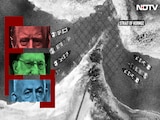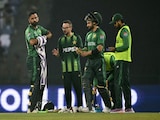- 11 children died in Madhya Pradesh due to Coldrif cough syrup, six are critically ill
- Post-mortems were not conducted for any of the 11 children despite families’ willingness
- NDTV learned the deputy drug controller went on a pilgrimage on October 1
11 children have died in Madhya Pradesh, and six more are fighting for their lives - with what their families claimed is linked to the 'Coldrif' cough syrup. But not a single postmortem has been conducted. NDTV's ground investigation revealed a trail of negligence, denial, and delay that runs deep into the Madhya Pradesh health system, even as Tamil Nadu uncovered the same contaminated cough syrup within 24 hours and banned it immediately.
In the dusty lanes of Parasia block, grieving parents are left asking one question: If Tamil Nadu could act overnight, why did Madhya Pradesh wait until 11 children died?
No Postmortems, No Answers
Not one of the 11 children who died after allegedly consuming the cough syrup 'Coldrif' underwent a post-mortem.
Parasia SDM Shubham Yadav claimed that families refused consent. But when NDTV visited the families, that claim fell apart. "No one from the administration or the hospital ever asked for a postmortem," said Yasin Khan, father of five-year-old Usaid, who died last month.
"We were never told it was necessary," said Amin Khan, father of Adnan, who died at Nagpur Medical College.
Another victim's family echoed the same: "No official ever came to speak with us."
A man, whose son died on September 2, said he had no objection to an autopsy, but no one ever asked.
The result: no forensic proof, no accountability, and no closure for grieving parents.
A System That Slept While Tamil Nadu Acted
The first case related to kidney failure was reported on August 24. Four-year-old Shivam Rathod died on September 2. Over the next two weeks, six more children died of kidney failure, yet officials dismissed it as a coincidence. It was not until September 29 that Chhindwara authorities banned Coldrif syrup, calling it "poisonous." But the test report confirming the toxicity only arrived four days later, on October 3, and the next day, it was banned in the entire state.
Meanwhile, Tamil Nadu's Drugs Control Department, upon receiving a letter from Madhya Pradesh on October 1, launched an investigation the same evening, even though October 1 and 2 were government holidays. By October 3, Tamil Nadu's lab confirmed that Coldrif syrup (Batch SR-13) contained 48.6 per cent Diethylene Glycol (DEG) - a lethal industrial chemical known to destroy kidneys. Within 48 hours, Tamil Nadu banned the syrup, froze all stock, and shut down the manufacturer, Sresan Pharmaceuticals, in Kanchipuram.
In Madhya Pradesh, however, the same urgency was missing.
NDTV has learned that deputy drug controller Shobhit Kosta, responsible for monitoring drug safety, went on a pilgrimage on October 1. Analysts at the Bhopal lab observed Navami and Dussehra holidays while Tamil Nadu scientists worked through Gandhi Jayanti.
When Tamil Nadu was testing, Madhya Pradesh was resting.
The Report That Exposed The Truth
After NDTV accessed the Tamil Nadu report confirming 48.6 per cent poison, the Madhya Pradesh Food and Drugs Administration finally swung into action, issuing an order on October 4 banning Coldrif syrup and all other products of Sresan Pharmaceuticals across the state. The letter, signed by Dinesh Kumar Maurya, Controller of Food and Drugs Administration, stated, "The Drug Coldrif Syrup, Batch SR-13, has been declared Not of Standard Quality and adulterated with Diethylene Glycol (48.6% w/v), a poisonous substance injurious to health."
The directive ordered all district drug inspectors to immediately freeze stocks and halt distribution.
Following the revelation, Chief Minister Mohan Yadav issued a statement.
"The deaths of children in Chhindwara are extremely tragic. The sale of this syrup and all other products of the company has been banned across Madhya Pradesh. The investigation report from Tamil Nadu was received this morning, and strict action has been taken," he said.
NDTV Finds 3 More Deaths
NDTV's investigation also revealed that the official death count of nine is an undercount. At least twelve children have died, including three cases that were not reported by the administration. Later, the government accepted 11 deaths, but one death in Betul has not yet been updated in government records.
Each child showed the same symptoms: fever, vomiting, and sudden stoppage of urination - classic indicators of Diethylene Glycol poisoning.
A Chain Of Negligence
While doctors in Nagpur had already found kidney toxicity in biopsy reports, the Chhindwara health department continued to allow sales of Coldrif syrup till September 29. Stocks from a distributor in Jabalpur were still reaching other districts.
Praveen Soni, a doctor in Chhindwara, who prescribed Coldrif syrup to children even after the Nagpur toxicity report, was arrested today. Most of the children were treated at the clinic of Praveen Soni, a paediatrician in Parasia. Soni's wife's and nephew's medical stores also continued to sell the drug unchecked.
However, the investigation so far spares those who allowed the deadly drug to circulate - the drug controller and local drug inspectors.















